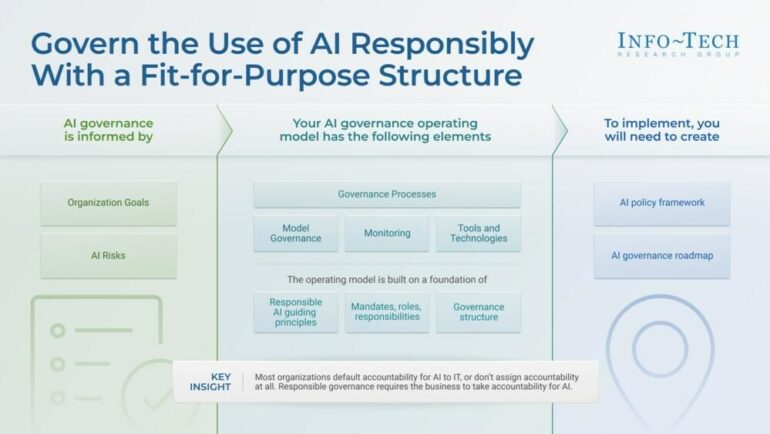- Info-Tech Research Group’s latest publication offers guidance on responsible AI governance in business settings.
- Emphasizes the importance of aligning AI use with organizational values and objectives.
- Highlights challenges in integrating AI risks into overall risk management frameworks.
- Advocates for robust AI governance to mitigate risks such as biases and privacy concerns.
- Outlines a methodology for IT leaders, including clarifying expectations, defining governance structures, and creating implementation roadmaps.
Main AI News:
As businesses increasingly prioritize responsible AI governance, IT leaders confront the task of crafting strategies that uphold ethical standards while driving innovation and managing risk. Essential to this endeavor is the formulation of strategic, tactical, and operational frameworks that harmonize AI applications with organizational values and objectives. The recent publication by Info-Tech Research Group, “Navigating AI Governance: Cultivating Ethical Practices for Business Advancement,” furnishes IT leaders with insights into risk management and the alignment of AI initiatives with core business principles. This resource aims to assist organizations in fostering a culture of accountability and adherence to ethical standards across all AI endeavors.
“Irresponsible AI deployment poses significant risks to organizations, undermining their objectives and ethical integrity,” remarks Irina Sedenko, Research Director at Info-Tech Research Group. “A structured approach to AI governance is essential for managing risks and ensuring the ethical and human-centric development and utilization of AI systems.”
Info-Tech’s findings underscore the challenges organizations encounter when integrating AI risks into their broader risk management strategies. Despite the presence of AI usage policies, many organizations lack robust mechanisms for monitoring and enforcing compliance. Whether organizations procure off-the-shelf AI solutions, collaborate with integrators, or develop proprietary models, effective AI governance is indispensable for safeguarding organizational interests and mitigating potential hazards.
“Prepackaged AI solutions carry inherent risks, including algorithmic biases and privacy concerns,” explains Swapnil Awasthi, Director of Workshop Quality at Info-Tech Research Group. “A comprehensive AI governance framework mitigates these risks by instituting guidelines and controls that align with the organization’s ethical standards, fostering transparency and fairness.”
According to Info-Tech, AI governance encompasses a suite of practices and frameworks geared toward aligning investments, resources, and risks with organizational objectives to yield tangible business benefits. To facilitate effective AI governance, Info-Tech’s blueprint outlines the following methodology for IT leaders:
- Clarify Expectations: Define the objectives, risks, and frameworks of AI governance.
- Assess Risk Controls: Evaluate the adequacy of existing AI risk management measures.
- Establish Principles: Articulate responsible AI principles tailored to the organization’s ethos.
- Define Governance Structure: Identify strategic, tactical, and operational components.
- Allocate Roles: Specify mandates, roles, and responsibilities within the governance framework.
- Foster Integration: Identify synergies between AI governance and existing governance structures.
- Develop Operating Model: Outline key elements of the AI governance operating model.
- Draft Charter: Formulate the initial version of the AI governance charter.
- Recommend Policies: Propose procedural and policy frameworks for AI governance.
- Create Roadmap: Chart the course for implementing AI governance initiatives.
“The necessity for AI governance remains consistent, whether organizations develop proprietary AI systems or integrate commercial AI solutions,” emphasizes Andrew Sharp, Research Director at Info-Tech Research Group. “Even when adopting off-the-shelf AI solutions, organizations must implement robust governance measures to align investments, risks, and resources with business objectives.”
Info-Tech’s blueprint elucidates how AI governance not only shapes an organization’s AI aspirations but also steers critical decisions necessary for their realization. By establishing a robust AI governance framework, organizations can effectively navigate risks, ensuring alignment with their AI mission and strategic goals, thus enhancing decision-making capabilities and risk management practices.
Conclusion:
Effective AI governance is paramount for businesses to navigate the delicate balance between innovation and ethics. Info-Tech’s blueprint provides invaluable insights and strategies for organizations to align AI initiatives with their core values and objectives, fostering a culture of accountability and ethical use. As businesses increasingly recognize the importance of responsible AI governance, those that prioritize ethical practices will not only mitigate risks but also enhance decision-making and drive long-term success in the evolving market landscape.

